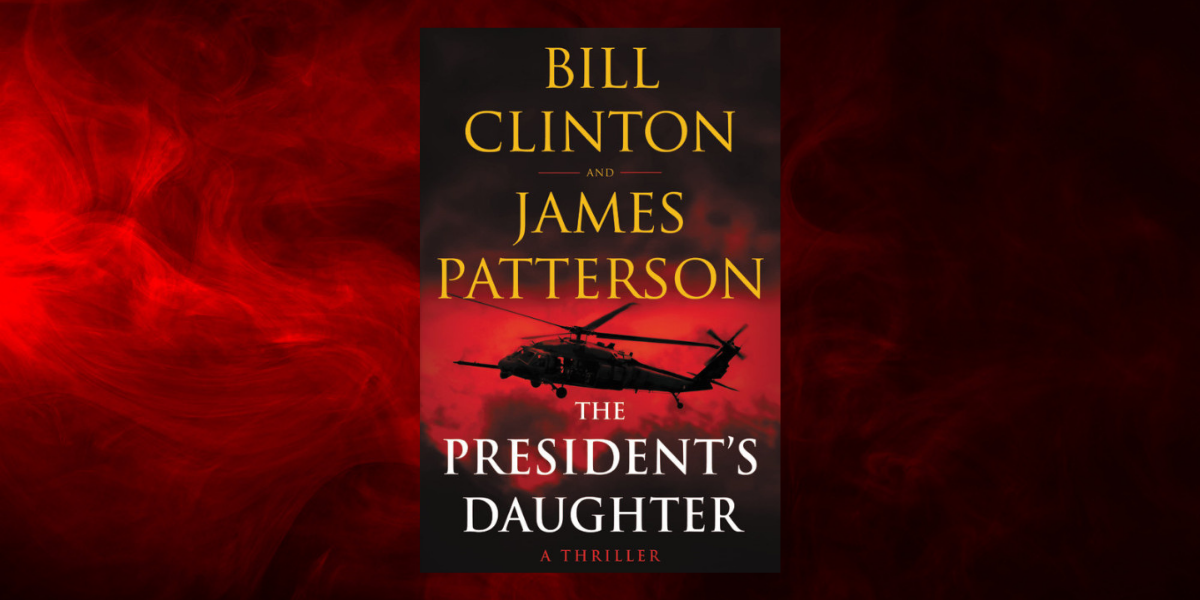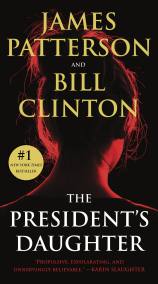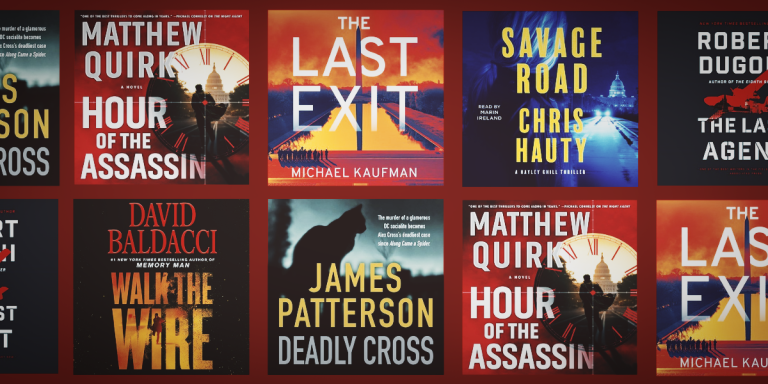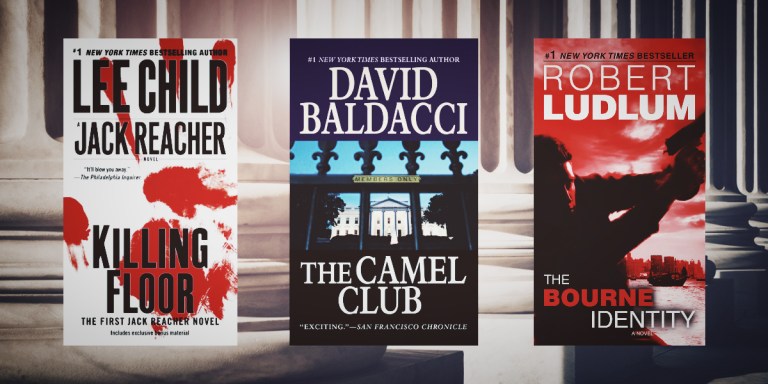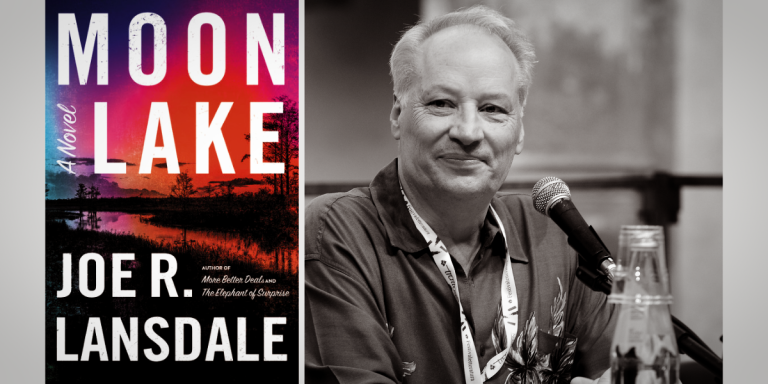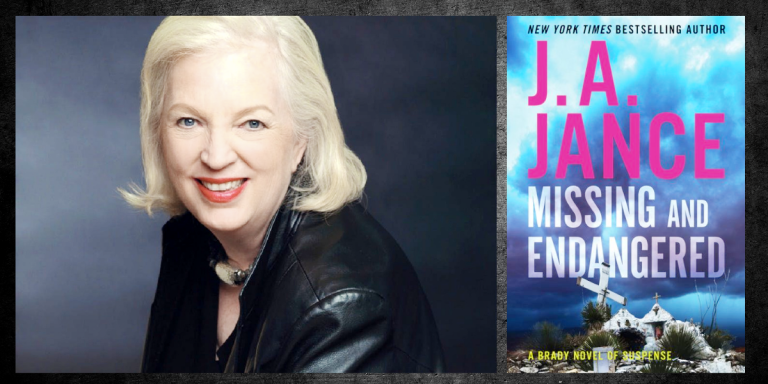Read the Excerpt: The President’s Daughter by James Patterson and Bill Clinton
Chapter 1
Two a.m. local time
Gulf of Sidra, off the coast of Libya
Aboard a Night Stalkers Special Operations MH-60M Black Hawk helicopter code-named Spear One, Navy chief Nick Zeppos of SEAL Team Six checks his watch. Five minutes ago, he and his crew departed from the USS Wasp amphibious assault ship outbound to their high-value target this deep dark night. If he and his crew—along with other SEAL fighters aboard a second Black Hawk helicopter, code-named Spear Two—are fortunate, they will track down and kill Asim Al-Asheed well before the sun rises.
Zeppos spares a quick glance at his team members, packed in tightly around him in two crowded rows. In the loud, vibrating helicopter’s interior, they’re mostly silent, some sipping from plastic water bottles, others leaning over, hands tightly clasped. Up forward, the Night Stalkers pilot and copilot from the famed 160th Special Operations Aviation Regiment Airborne are flying at low altitude, about ten meters above the choppy water, instruments glowing green and blue. Zeppos knows that every SEAL team member inside the dimly lit helicopter is going over the upcoming mission, thinking about their training, then clearing their minds for what’s ahead:
Killing Asim Al-Asheed.
It’s been a long-range goal of the American intelligence agencies and military. Tonight, after four years of preparation, Zeppos hopes they will hit the jackpot.
SEAL teams and Special Forces have gone after terrorist leaders before—notably Osama bin Laden and Abu Bakr al-Baghdadi and their many deputies and allies, leaders who stayed in the shadows, issuing the orders, not getting their hands soiled beyond making grainy videotapes and flowery promises of death and revenge.
“We’re coming up on feet dry!” comes the call from the Night Stalkers crew chief, indicating that they’re about to cross over from the sea to the land of Libya, one fractured and squabbling nation, a perfect place to incubate or shelter terrorists like Al-Asheed.
But Al-Asheed is not like other leaders of terrorist organizations.
For the past several years, videos have appeared documenting his group’s actions, each showing Al-Asheed in the center of the bloody chaos, depending on a well-planned and well-hidden network of supporters who would only appear to assist him at the last moment and then disappear.
Asim in a crowded shopping mall in Belgium, holding up a trigger device and calmly pressing the button, the hollow boom! echoing through the concourse, causing the camera to shake, but not enough to hide the billowing cloud of smoke, the screaming shoppers running by, blood trickling down their torn faces and fractured arms.
Asim walking down a street in Paris, cameraman following him, as he unlimbers an automatic rifle from under a long raincoat, shooting into crowds of pedestrians, aiming especially for the women and children, until a white van picks him up and drives him safely away.
Asim standing behind two sobbing female aid workers from the United Nations in the Sudanese desert, their legs and arms bound, as he calmly goes from one to the other, wielding a large sword and beheading both of them, their blood spattering his clothes.
Navy chief Zeppos stretches his legs, draws them back. Twice before he’s been on raids—once into Yemen and once into Iraq—where the intel indicated a good probability that Asim was there, but good wasn’t good enough. Both raids had come up empty, with no results except for wounded SEALs, shot-up helicopters, and frustration all around.
But Zeppos hopes that the third time will be the charm.
There are other video recordings too gruesome to be released to the public. A woman schoolteacher in Afghanistan, chained to a rock, doused with gasoline, and set afire. A village elder in Nigeria, held tight by men from Boko Haram, as Asim goes down a line of his family members, slitting their throats.
And Boyd Tanner…
Zeppos spares a glance through the near porthole—he wants not to think of Boyd Tanner, whose cause of death is a closely kept secret among the Special Forces community—and sees the bright glow of light on the horizon marking the rapidly rebuilding port city and capital of Tripoli. The Chinese—in their program called the Belt and Road Initiative—have been pouring in development investments here and in other poor countries around the world.
Publicly, the Chinese government says it’s just a way for them, as a growing world power, to share their good fortune and knowledge. Privately, Zeppos and others have received classified briefings depicting the Chinese’s real goal: securing resources, allies, and possible future military bases so China can never again be isolated and humiliated as it so often has been in its long history.
The glow on the horizon fades away. Spear One and Spear Two are now over the rolling Libyan deserts where decades back the Germans and British desperately fought, and where their rusted-out tanks and trucks still remain in the unforgiving sands.
Before them, the Italians were once here, and now the Chinese, Zeppos thinks.
Big deal.
He starts to recheck his gear.
The crew boss comes back on the intercom.
“Chief, we’ve got incoming traffic for you,” he says.
Zeppos toggles his mic. “Who? JSOC?”
“No, Nick,” the aviator says. “Definitely not JSOC.”
Shit, he thinks. Who would dare bother him now?
“Patch it through,” he says, and there’s a crickle-crackle of static, and a very familiar voice comes through, one he’s heard scores of times over the radio and TV.
“Chief Zeppos?” the man’s voice says. “Matt Keating here. Sorry to bother you, I know you’re busy, you don’t need me to waste precious seconds. But I wanted to let you know that there’s nothing I’d want more than to be riding with you right now.”
“Ah, thank you, sir!” he says, raising his voice so the president can hear him.
Keating says, “I have full faith in you and your team that you’ll get the job done. No worries on this end. I’ve got your back. Now you squids body-bag that son of a bitch for the country, the SEALs, and especially for Boyd Tanner. Keating out.”
“Yes, sir,” Zeppos says, part of him in awe that the man would call him personally, part of him touched by his sincere words, and yet, he hates to admit to himself, Zeppos is pissed off that he’d call right now, in the middle of an op!
Shit, he thinks. Politics sure can screw up a man. Then he cuts the president some slack. Keating had been one of them. And he knew about Boyd Tanner.
From SEAL Team Two.
Only a few were supposed to know how he died, and it was not, as his grieving wife and kids were told, in a training accident.
Captured last year after a brutal firefight in Afghanistan, wounded and barely alive. Asim Al-Asheed and his fighters had stripped Boyd Tanner of his gear, his clothes, and taken him to a courtyard, recording it all the while.
Whereupon Asim—using a hammer and spikes—had crucified the Navy warrior on a gnarled tree. The video captured the agonizing hour that Tanner hung there before the captors grew bored and slit his throat.
A couple of guys down the length of the Black Hawk are laughing. Zeppos leans over, sees one of his crew—Kowalski—holding up what looks like a wooden spear with a metal tip.
Zeppos calls out, “What the hell is that thing for?”
Kowalski laughs and flourishes the spear. “Asim Al-Asheed,” he yells out. “Once we ID his remains, we should take his head off, put it on this pike, and bring it back to the Oval Office! Don’t you think the president will love that?”
More laughter, and Zeppos settles back into the uncomfortable seat, grinning.
Yeah.
It’s a good night for him and his fellow warriors to avenge the deaths of so many innocents, and to finally come face-to-face with Asim Al-Asheed, give him a few seconds to recognize who’s before him, and then put two taps in his chest and one in his forehead.
This darkened Black Hawk helicopter and its shadowy companion speed into the night.
Chapter 2
Two fifteen a.m. local time
Embassy of the People’s Republic of China, Tripoli
It’s damn well late at night—or early in the morning—in the ground-floor reception room for the Chinese Embassy on Menstir Street and Gargaresh Road, and Jiang Lijun, who’s listed on the embassy guest list as a vice president for the China State Construction Engineering Corporation, is stifling a yawn.
This supposed party was to have ended more than an hour ago, but the special guests from this blasted country still won’t leave. The political leaders, the tribesmen, and the military officers—gaudy in their uniforms, stripes, and medals, like little boys playing dress-up—are still smoking, drinking, and talking to their patient hosts in various corners of the room.
Jiang sees that the local representatives from the Great Wall Drilling Company, CNPC Services & Engineering, China National Petroleum Corporation, and so many others are valiantly standing in for zhōng guó—the Middle Country—by smiling, laughing at the stupid attempts at humor, and otherwise entertaining their peasant guests.
And what barbarians! Even after the lights were dimmed, the near-empty food platters were taken away, and the liquor and bottles of beer—Carlsberg, Heineken, Tsingtao—were removed, these peasants didn’t get the message that it was time to wander back to their flea-infested hovels. No, they stayed and gossiped, and some even pulled flasks of liquor from their coat pockets, even here, in this supposedly Muslim country. When he was an exchange student at UCLA, in California, and then at Columbia, in New York, a young Jiang thought he would never encounter a more childish, reckless, and ignorant group of uncouth people, but these Libyans make the Americans seem like honorary Han.
He takes out a pack of Zhonghua cigarettes and lights one. He’s standing by himself near two large potted plants, seeing who is talking to whom, which members of the embassy staff look drunk or impatient, and observing the groupings of Libyan guests. A very fragile cease-fire and reconciliation government arose last year, but Jiang still wants to see which tribe members stay away from their alleged fellow countrymen, perhaps setting the stage for a future breakup or civil war.
Good information to have ahead of time.
A slim, bespectacled embassy worker wearing an ill-fitting black suit comes in from the far side of the banquet room. He scans the crowd as he hurries across the polished floor. Ling—that’s the boy’s name. Jiang takes one last puff of the cigarette, stubs it out in the dirt of the nearest potted plant, and waits.
The worker comes to him, bows slightly, and says, “My apologies, sir. Your presence is requested in the basement. Room twelve.”
Jiang nods, starts walking across the room, whereupon a heavyset bearded man, swaying drunk and wearing typical tribal garb of billowing white blouse and black slacks, abruptly steps in front of him.
“Mr. Jiang!” he calls out in accented English, grasping Jiang’s shoulders, and Jiang keeps a wide smile frozen on his face, trying not to choke from breathing in the alcoholic fumes coming from this dirty peasant. “Are you leaving? Are you?”
Jiang pats the man’s worn hands, gently tugs them off his shoulders. “I’m sorry, my friend, but you know how it is,” he replies, also in English, the lingua franca of diplomacy in so many parts of the world. “Duty calls.”
The man—Jiang can’t recall his name, only knows he’s the leader of one of the 150 or so tribes in this barren land—sways again, belches, and says, “Duty, yes.” Tears come to his eyes. “I must say this…I must…but your duty, your presence here, it has brought so much to our land. The Italians, the French, the British, the Qataris, the damn Egyptians…they have all tried to rule us, take our resources…Who would think the yellow race would travel halfway around the world to shower us with your wisdom and knowledge?”
At this very moment, Jiang wants to slap the man hard in the face, spin him around, twist and break his neck—Yellow race, indeed!—and drop him on the floor.
Instead, mindful of who he is and what he must do, Jiang keeps smiling, squeezes the man’s filthy hands, and says, “When I next return to Beijing, I will make sure that your words of thanks are passed along to our president.”
And with that, Jiang briskly walks away, feeling the need to go to a washroom and scrub that peasant’s stench and dirt off his hands, but instead he presses on.
Duty.
He walks past two unsmiling embassy guards with partially hidden earpieces and pistols barely covered by their suits, and he meets up with Ling, standing by the entrance to the lift. Ling is holding the door open for him and Jiang ignores him, taking the stairs to the basement, moving fast. The electricity in this alleged country still has its sudden blackouts, and even with the building’s backup generators, Jiang isn’t going to risk being stuck between floors.
He opens the door to the basement, going past another embassy guard, going down an ill-lit hallway, until he comes to a heavy steel door equipped with a palm-print reader mechanism. Jiang presses his right hand down, there’s a brief flare of light, and the steel door swings open.
Jiang steps inside, the door swinging shut and locking behind him. The room is pleasantly cool and comfortable, and he’s now craving a smoke, but there’s no smoking allowed in here, in the embassy operations center for China’s Ministry of State Security, staffed around the clock.
The night-duty officer, Liu Xiaobo, wearing black-rimmed glasses, casually dressed in black pants and white open-collared dress shirt, is typing on a keyboard in front of a large computer monitor. “How goes that party upstairs?” he asks. “Lots of camel dung on the floor?”
“Not yet,” Jiang says. “What’s going on?”
The small room is jammed with filing cabinets, counters, computer monitors, television screens showing CNN, the BBC, and CCTV-13, the China Central Television news channel, as well as plasma screens depicting North Africa, the Mediterranean, and the Gulf of Sidra. Eight other members of the Ministry of State Security are also at work this early morning.
Liu says, “The Americans are up to something.”
“Aren’t they always? Those dog whelps. What is it this time?”
“They have an amphibious assault ship in the Gulf of Sidra, about twenty kilometers off the Tripoli coast,” Liu says, pointing to a reference map on his large video screen. “Thirty minutes ago, they launched two UH-60 helicopters, Black Hawks. They’re heading in this direction”—a nicotine-stained finger traces a path on the glowing screen—”and have violated Libyan airspace and are now about…here.”
Jiang stares at the screen, at the little triangles marking towns and villages, the geography so flat and nearly featureless until—
“They are heading to the Nafusa Mountains,” Jiang says.
“Yes,” Liu replies. “They appear to be flying straight and level—no evasive maneuvers—and based on the fuel consumption of their helicopters, there is barely enough fuel to get there and return back to the Wasp. To me, that says they are going after something very important in those peaks, something worth the risk of running out of fuel.”
A stinging bee, Jiang thinks. What kind of fools name a warship after an insect?
He focuses again on the video display.
Liu cautiously says, “Don’t you have…an interest in the Nafusa Mountains?”
From long practice and years of work, Jiang keeps his face impassive, his breathing regular, his body still. One does not succeed or get promoted by showing emotion. “Anything else?” he asks.
“No,” Liu says. “I just wanted you to know.”
Jiang gently clasps the man’s shoulder. “That is appreciated, comrade.”
Liu appears to enjoy the attention from a man higher up than he is. “May I do any other service for you?”
Jiang nods. “Yes. You have a worker here named Ling, correct? The one who came to fetch me?”
Liu’s voice is cautious. “Yes.”
“Get him on the next transport home,” Jiang says. “Ensure he ends up working for the largest pig farm in Liaoning. Earlier, when he came to me, he nearly ran across the room, practically shouting at me, telling anyone with a brain larger than a pea that I was someone of importance, and not just a typical technocrat. He needs to be punished.”
“Very well,” Liu says.
“Good,” Jiang says. “Now it’s time to return upstairs, to see if the camels have arrived, and if the peasants up there are tossing lumps of dung at each other.”
Liu laughs at that, returns to his large screen. Jiang walks away and uses a hand scanner to depart the operations center, going back into the empty hallway. If he were to turn left, he would go back to the upward staircase to the reception.
Instead, he turns right, walking quickly to his office at the other end, where Jiang Lijun is not a vice president for the China State Construction Engineering Corporation but a senior officer with the Ministry of State Security.
What the hell are the Americans up to?
Chapter 3
Two thirty a.m. local time
Nafusa Mountains, Libya
Aboard Spear One, the crew chief yells out, “Two minutes! Two minutes to target!”
Nick Zeppos holds up two fingers in acknowledgment, and the other team members each hold up two fingers in response. They take off the helicopter’s comm gear, put on their helmets with NVGs, which they quickly lower. Zeppos switches on the goggles, and the interior of the modified and stealth Black Hawk comes into sharp, ghostly green view.
Two minutes.
One hundred and twenty seconds.
The voice of Spear One’s pilot comes to Zeppos: “Target in sight, at about two o’clock.”
Zeppos quickly recalls one other horrific murder that Asim Al-Asheed committed, two years ago, when in front of his followers he and his group executed a Syrian family they thought had betrayed him, and they broadcast a video of the killing to the world. A simple execution, the family had been herded into a steel cage, doused with gasoline, and Asim had struck the match.
The last clear image on the videotape, before the billowing smoke obscured the lens, was the crumpled form of the mother among the flames, desperately and futilely covering her dying son’s body with her own.
“Thirty seconds,” the pilot announces.
The helicopter’s crew chief unlatches the side door, slides it open. Zeppos gives his gear one last check. Cold air rushes in. Zeppos stands up and calls out, “Stick close, move fast, let’s get this done.”
Nods of acknowledgment and thumbs-up from his team members, all looking like the proverbial bug-eyed monsters, with gear, weapons, and helmets with the four-lensed NVGs. Zeppos leans out the open doorway, takes in the buildings quickly coming into view. Three small buildings to the left, one larger building to the right, set back by itself.
That’s Asim Al-Asheed’s home, where he is at this very moment, based on all the streams of intelligence gathering that came together to send Zeppos and his team out here tonight.
The structures are all one story. Built of rock and stone. A goat corral in the distance. And that’s it. Not even enough buildings to make it a village.
The Black Hawk helicopter flares out, hovers less than a meter above the rocky ground, and in seconds Zeppos is first off, his Oakley combat boots touching ground in the western mountains of Libya, near the border with Tunisia. He’s carrying about fifty pounds of gear, along with his Heckler & Koch 416 with extended magazines, but whenever an op like this kicks off, Zeppos feels light and trim.
Through his night-vision goggles he sees the shapes of the other SEAL members, dropped off by Spear Two, as they move forward in the well-practiced bounding overwatch attack, with sections staying behind, providing cover to those in the lead, and then leapfrogging ahead to take point. Nick takes the lead, head moving back and forth, back and forth, seeing thin lines of the infrared laser sights moving around in the cold and dark air through his NVGs.
Still quiet.
He moves up the slope to the little compound, looking, evaluating, scanning.
Nobody’s made contact yet?
No emerging target on the roofs of the three small buildings?
Too damn quiet.
His team is spread out in their roles, weapons at the ready, heads moving back and forth. Their advance should have encountered resistance by now.
“Breach team,” Nick whispers to the men next to him. “Go.”
With his NVGs, he sees the infrared laser designators flickering around as he keeps on moving. The breach team moves around the larger building, goes to a side window. Chances are the main door is booby-trapped.
He feels a slight thump through the soles of his boots, a brief flare of light.
Movement of his team into the building.
He and the others keep up their silent movement.
Through the earpiece to his PRC 148 MBITR radio, he hears one of his team, Ramirez: “Nick.”
“Go.”
“We’re in the target house.”
“Yeah?”
“It’s empty,” says the disappointed voice. “Nobody’s here.”
Chapter 4
Seven thirty p.m. local time
White House Situation Room
It’s crowded in the Situation Room this tense evening. I’m at the head of the table, watching the raid on Asim Al-Asheed’s compound unfold. It’s tight quarters, with Vice President Pamela Barnes sitting in the near corner, staring at the video screens, and with Admiral Horace McCoy, head of the Joint Chiefs of Staff, sitting at my elbow. Next to him are a Navy captain and an Army colonel, tapping away on their secure government laptops, whispering information for McCoy to pass on to the crowd in this historic room. Funny thing that doesn’t get reported much is that there’s more than just one room in here, the others full of staff serving and processing information from around the world.
Besides the vice president, the other officials in here are Jack Lyon, my chief of staff; the members of my national security team; and a White House photographer.
The two most important are a stern Black woman with long, braided hair, Sandra Powell, the national security advisor, and Pridham Collum, secretary of defense, a smooth-faced bespectacled man who looks younger than his forty years.
Sandra is both a defense and foreign policy expert and the author of several policy books that are actually easy to read. Pridham was appointed because of his mastery of the Pentagon’s massive, complex budget and his extraordinary ability to cut through the regulatory and procurement jungle to get needed weapons systems off the design software and into the field. He also has important defense experience from his previous job, as a deputy assistant secretary for International Security Policy.
Though the media refers to them as President Keating’s security team, they’re largely my predecessor’s team. I just haven’t had the time to evaluate them and decide who I want to stay on as my term ends its first full year, which began six months ago, when my predecessor, President Martin Lovering, died of an aortic aneurysm that ruptured while he was fishing on the Columbia River in his beloved Washington State.
Admiral McCoy says, “Spear One and Spear Two are thirty seconds out from the target.”
Order The Book
All Presidents have nightmares. This one is about to come true.
A rocket ride of a thriller—the new blockbuster by President Bill Clinton and James Patterson, “the dream team” (Lee Child).
Every detail is accurate—
because one of the authors is President Bill Clinton.
The drama and action never stop—
because the other author is James Patterson.
Matthew Keating, a one-time Navy SEAL—and a past president—has always defended his family as staunchly as he has his country. Now those defenses are under attack.
A madman abducts Keating’s teenage daughter, Melanie—turning every parent’s deepest fear into a matter of national security. As the world watches in real time, Keating embarks on a one-man special-ops mission that tests his strengths: as a leader, a warrior, and a father.
By clicking 'Sign Up,' I acknowledge that I have read and agree to Hachette Book Group’s Privacy Policy and Terms of Use
What to Read Next
